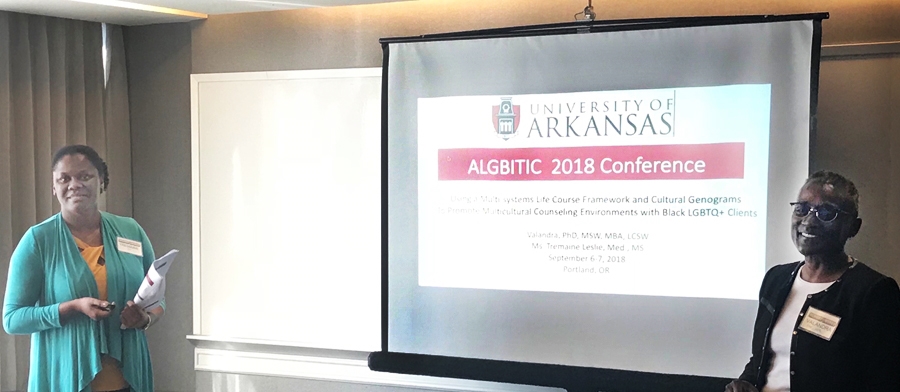Tremaine Leslie, a graduate student in the University of Arkansas counselor education and supervision program, and Valandra, director of the African and African American Studies program and assistant professor of social work, co-presented on counseling with Lesbian, Gay, Bisexual, Transgender, and Queer Women of Color clients at the third national Association for Lesbian, Gay, Bisexual, Transgender, and Queer Issues in Counseling Conference in Portland, Oregon, on Sept. 5-7.
Recognizing the need for counselors to be better equipped to work with intersectionally diverse sexual minority populations, Leslie, a third-year doctoral student, invited Valandra to collaborate in presenting at the conference. Valandra serves as Leslie's mentor in the African and African American Studies program, where Leslie is currently a graduate teaching assistant.
Valandra explained in one of their abstract submissions that societal attitudes are becoming more positive and accepting of LGBTQ-plus individuals and increasingly, LGBTQ-plus persons of color are utilizing counseling services. However, while mental health services are becoming more accessible, research on the mental health experiences of sexual minorities still indicate that they are at risk for experiencing discrimination, hostility and culturally insensitive therapy environments and sexual orientation microaggressions. Presentations by Leslie and Valandra offered attendees multicultural tools for addressing these mental health disparities.
Their oral presentation, titled "Using a Multi-systems Life Course Framework and Cultural Genograms to Promote Multicultural Counseling Environments with Black LGBTQ-plus Clients," offered counseling practitioners with assessment tools to help them understand the ways culture impacts the role of the therapist, the therapeutic style and effectiveness, and how it influences the lives of clients in treatment.
Leslie and Valandra also presented a poster titled "Using the Minority Stress Model as an Integrative Framework for Understanding the Impact of Intersectionality on the Lived Experiences of Queer Women of Color." The purpose was to help practitioners critique the minority stress model as an integrative framework to develop greater awareness of the social and emotional supports needed by queer women of color.
Leslie noted in the abstract for the poster that counselors must cross-examine their own culture to understand their worldview, biases, and beliefs and to avoid excluding, erasing, and marginalizing the lives of LGBTQ-plus people of color living at the intersections of multiple marginalized identities within our communities. LGBTQ-plus focused organizations, oftentimes have miniscule knowledge of the struggles queer women of color face when their race, gender, class, and sexual orientation interconnects. This lack of knowledge can lead to attitudes and practices of racism, sexism, classism, homophobia and heterosexism perpetuated by organization leaders, whether explicitly or implicitly. The role of the practitioner in creating a culturally sensitive professional working environment is critical for treatment in work with sexual minority clients living at the intersections of multiple identities.
The National Black Justice Coalition estimated that 1.0 million or 3.7 percent of African Americans identify as LGBTQ-plus and approximately 84,000 blacks are same gender couples. As black LGBTQ-plus individuals. Additionally, 41 percent of same gender couples with children identify as people of color compared with 34 percent of married different gender couples with children according to American Community Survey.
As traditionally underrepresented communities continue to access mental, physical, and behavioral health services, practitioners will need to continue availing themselves of ongoing training and educational tools that assist them in understanding how their culture and worldview influences the therapeutic environment and can shape mental health outcomes for LGBTQ-plus families of color.
Topics
Contacts
Valandra, program director, African and African American Studies
assistant professor, School of Social Work
479-575-3525,
